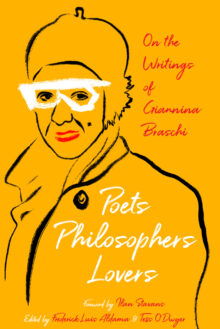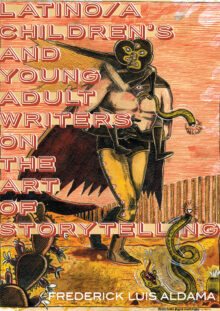

Frederick Luis Aldama
Frederick Luis Aldama, aka Professor Latinx, is the Jacob and Frances Sanger Mossiker Chair in the Humanities and founder and director of the Latinx Pop Lab at the University of Texas, as well as adjunct Distinguished University Professor at The Ohio State University. He is an award-winning author of dozens of books as well as editor of nine academic press book series. His fiction includes the children’s books The Adventures of Chupacabra Charlie and Con Papá/With Papá.
Poets, Philosophers, Lovers
On the Writings of Giannina Braschi
With a foreword by Ilan Stavans
This collection of essays, by fifteen scholars across diverse fields, explores forty years of writing by Giannina Braschi, one of the most revolutionary Latinx authors of her generation. Since the 1980s, Braschi’s linguistic and structural ingenuities, radical thinking, and poetic hilarity have spanned the genres of theatre, poetry, fiction, essay, musical, manifesto, political philosophy, and spoken word. Her best-known titles are El imperio de los sueños, Yo-Yo Boing!, and United States of Banana. She writes in Spanish, Spanglish, and English and embraces timely and enduring subjects: love, liberty, creativity, environment, economy, censorship, borders, immigration, debt, incarceration, colonialization, terrorism, and revolution. Her work has been widely adapted into theater, photography, film, lithography, painting, sculpture, comics, and music. The essays in this volume explore the marvelous ways that Braschi’s texts shake upside down our ideas of ourselves and enrich our understanding of how powerful narratives can wake us to our higher expectations.
Latino/a Children’s and Young Adult Writers on the Art of Storytelling
Children’s and young adult literature has become an essential medium for identity formation in contemporary Latino/a culture in the United States. This book is an original collection of more than thirty interviews led by Frederick Luis Aldama with Latino/a authors working in the genre. The conversations revolve around the conveyance of young Latino/a experience, and what that means for the authors as they overcome societal obstacles and aesthetic complexity. The authors also speak extensively about their experiences within the publishing industry and with their audiences. As such, Aldama’s collection presents an open forum to contemporary Latino/a writers working in a vital literary category and sheds new light on the myriad formats, distinctive nature, and cultural impact it offers.


